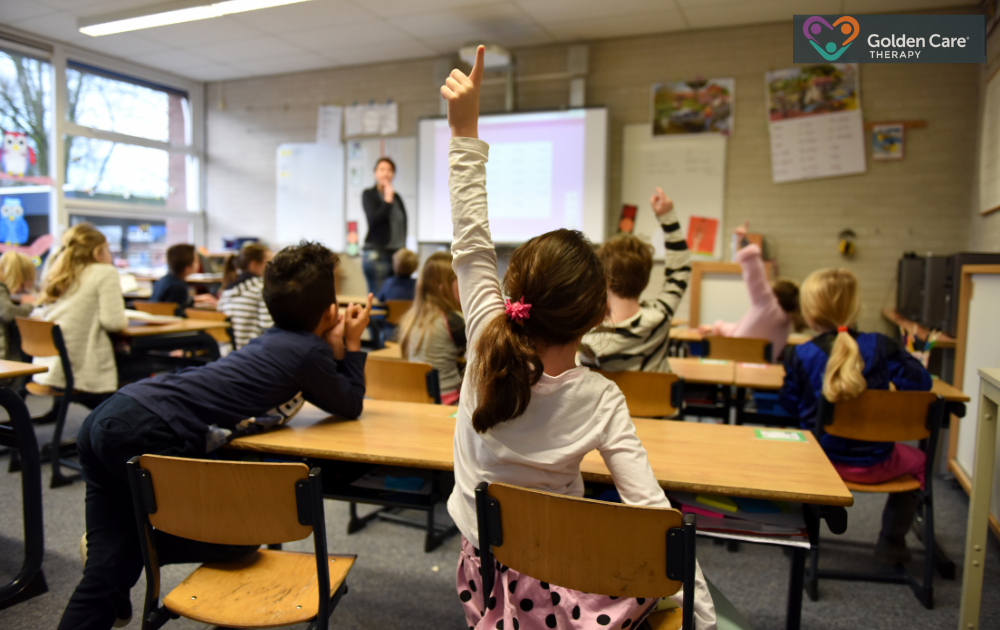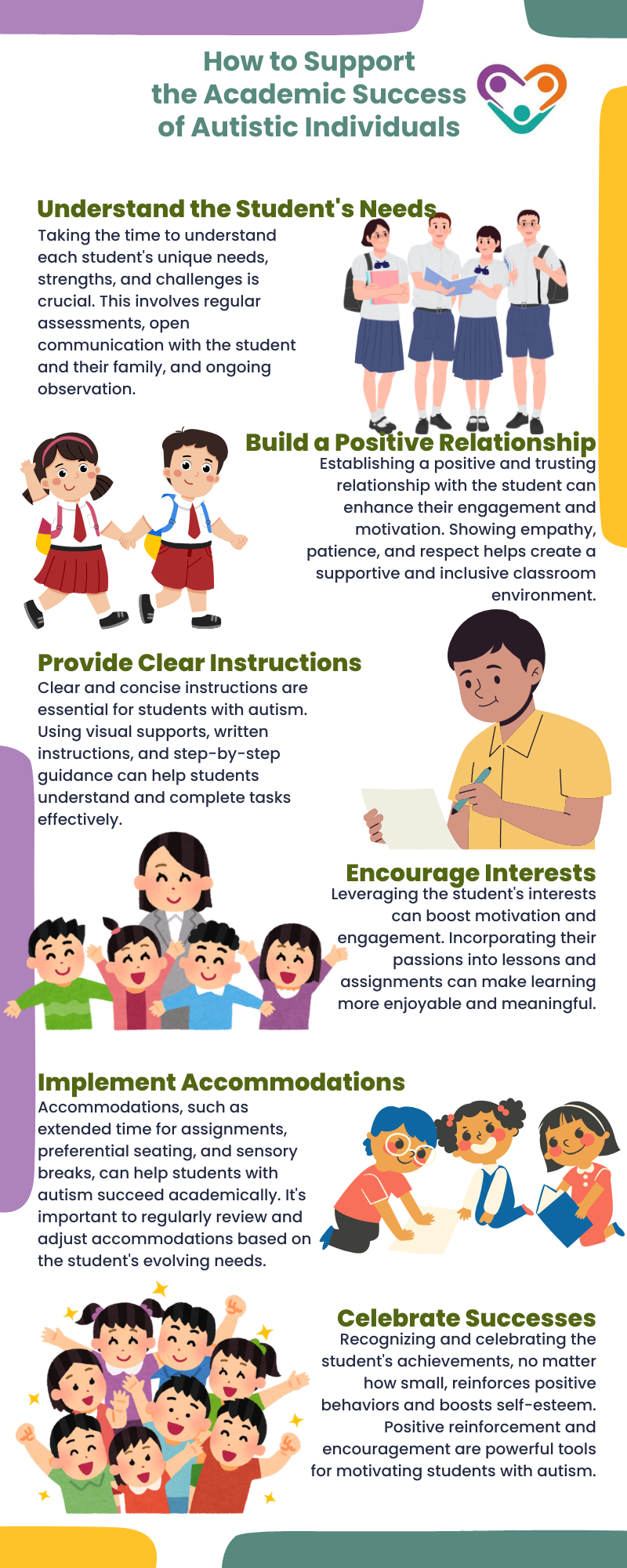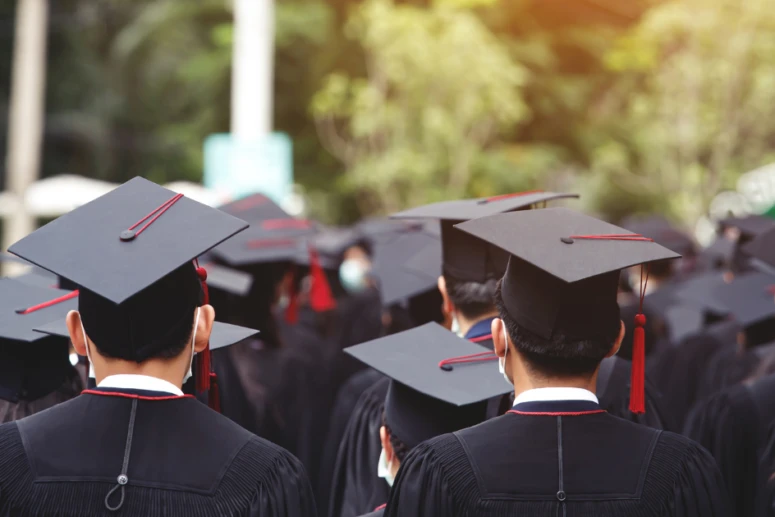Understanding how autism spectrum disorder (ASD) impacts academic performance is essential for supporting the success of students with autism. It’s worth noting that each individual with autism is unique, and their academic experiences can vary widely.
However, some common challenges and strategies can help improve academic performance for students on the spectrum. In this article, we will explore these challenges and offer tips that will help autistic individuals succeed in their academic goals.

Autism and Its Impact on Learning
Autism spectrum disorder is a developmental condition that affects communication, behavior, and social interaction. According to the Centers for Disease Control and Prevention (CDC), about 1 in 36 children in the United States is diagnosed with ASD.
The spectrum nature of autism means that it presents differently in each individual, with varying degrees of severity and a wide range of symptoms and abilities. Many students with autism experience challenges in communication. Some may have limited verbal abilities, while others might struggle with understanding social cues and nonverbal communication. These difficulties can affect classroom participation, comprehension of instructions, and peer interactions.
Students with autism may also exhibit repetitive behaviors, have strict routines, or experience sensory sensitivities. These behaviors can sometimes disrupt learning and make it difficult to adapt to changes in the classroom environment.
Social difficulties are a hallmark of autism. Students may find it challenging to make friends, work in groups, or understand social norms. These challenges can impact collaborative learning opportunities and create feelings of isolation.
Executive functioning skills, which include planning, organization, time management, and flexible thinking, can be impaired in students with autism. This can lead to difficulties in completing assignments, managing time effectively, and adapting to new tasks.

Academic Strengths of Autistic Students
While students with autism face challenges, they also often possess unique strengths that can be leveraged for academic success. These strengths include exceptional attention to detail, strong memory skills, and intense focus on specific interests.
They’re as follows:
- Attention to Detail: Many individuals with autism have a keen eye for detail, which can be advantageous in subjects such as mathematics, science, and technology. This ability can help them excel in tasks that require precision and thoroughness.
- Strong Memory Skills: Students with autism often have excellent memory skills, particularly for facts and figures. This can be beneficial in subjects that require memorization, such as history or science.
- Intense Focus: When students with autism have a strong interest in a particular topic, they can exhibit remarkable dedication and focus. This can lead to deep expertise and high achievement in their areas of interest.
Strategies for Supporting Academic Success
Supporting the academic success of students with autism requires a comprehensive and individualized approach. Educators, parents, and caregivers can implement various strategies to address the unique needs of these students and create an inclusive learning environment.
Let’s look at each of them.
Individualized Education Plans (IEPs)
An Individualized Education Plan (IEP) is a crucial tool for students with autism. It outlines specific goals, accommodations, and support services tailored to the student’s needs. IEPs should be regularly reviewed and updated to reflect the student’s progress and evolving requirements.
Communication Support
Enhancing communication is essential for academic success. Speech and language therapy can help students improve their verbal and nonverbal communication skills. Additionally, using visual supports, such as picture schedules and social stories, can aid in understanding and expressing information.
Behavioral Interventions
Implementing positive behavioral interventions and supports (PBIS) can help manage challenging behaviors and promote positive behaviors. Consistent routines, clear expectations, and reinforcement of desired behaviors are key components of PBIS.
Sensory Accommodations
Creating a sensory-friendly classroom environment can significantly benefit students with autism. This might include providing noise-canceling headphones, allowing movement breaks, and minimizing sensory distractions. Understanding each student’s sensory preferences and triggers is essential for creating a comfortable learning space.

Social Skills Training
Social skills training can help students with autism develop the skills needed for successful interactions with peers and teachers. Role-playing, social stories, and group activities can enhance social understanding and build confidence in social situations.
Executive Functioning Support
Providing support for executive functioning skills is crucial for helping students with autism manage their academic responsibilities. This can include using visual schedules, breaking tasks into smaller steps, and teaching time management techniques.
Technology Integration
Technology can be a valuable tool for students with autism. Assistive technology, such as speech-to-text software and educational apps, can support communication, organization, and learning. Additionally, incorporating technology into lessons can engage students and cater to their interests.

Collaborative Approaches to Support
A collaborative approach involving educators, parents, caregivers, and specialists is essential for supporting the academic success of students with autism. Effective communication and teamwork will ensure that the student’s needs are consistently met across different settings.
Parents play a vital role in their child’s education. Regular communication between parents and teachers can provide valuable insights into the student’s strengths, challenges, and progress. Parents can also reinforce learning strategies and support at home.
Educators should also receive training on autism and evidence-based teaching strategies. Professional development programs can enhance teachers’ understanding of autism, improve their ability to implement accommodations, and create inclusive classroom environments.
Moreover, collaboration with specialists, such as speech therapists, occupational therapists, and behavior analysts, can provide additional support for students with autism. These professionals can offer targeted interventions and strategies to address specific challenges.
Lastly, encouraging peer support and fostering an inclusive classroom culture can benefit students with autism. Peer buddies, group projects, and cooperative learning activities can promote social interaction and create a supportive learning community.
Case Studies and Research Findings
Research and case studies provide valuable insights into effective strategies for supporting students with autism.
One study highlights the importance of individualized interventions in improving academic outcomes for students with autism. The study found that personalized support, including tailored teaching methods and behavioral interventions, led to significant improvements in academic performance and social interactions.
Another study examined the educational attainment of young adults with autism. The researchers found that students with autism who received special education services and had strong family support were more likely to achieve higher levels of education. This emphasizes the importance of comprehensive support systems for academic success.
A case study explored the use of peer-mediated interventions to improve social skills and academic engagement in students with autism. The study demonstrated that peer support and inclusive classroom practices led to increased social interactions and improved academic performance for students with autism.
Tips for Success
While each student with autism is unique, there are general tips that can support their academic success. These tips are grounded in research and best practices and aim to create a positive and inclusive learning environment.
They’re as follows:

Conclusion
Supporting the academic performance of students with autism requires a comprehensive and individualized approach. Understanding the unique challenges and strengths of each student, implementing evidence-based strategies, and fostering a collaborative and inclusive learning environment are key to their success.
By providing tailored support and creating a positive educational experience, educators, parents, and caregivers can help students with autism thrive academically and reach their full potential. If you’re seeking additional support, consider in-home ABA therapy in NJ, Indiana, Georgia, and New York. Golden Care offers personalized services to meet your child’s unique needs. Contact us today to learn more or book a consultation.
Sources:
https://www.autismspeaks.org/tool-kit-excerpt/autism-classroom-strategies
https://info.cipworldwide.org/blog/achieving-success-in-college-strategies-for-students-with-autism

